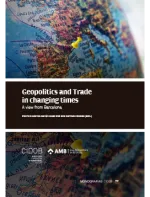China and the European Union: From strategic partners to systemic rivals

In 2003, the European Union and China signed a strategic partnership agreement. The Europeans believed that as China developed it would become more liberal and perhaps even more democratic. Two years earlier the Asian giant had joined the World Trade Organization (WTO), integrating itself into global economic structures and value chains, and it was hoped that within 15 years – as the accession treaty stipulated – China would became a market economy. It is crucial to understand the mindset of the time. The Berlin Wall had fallen just over a decade earlier, the Soviet Union had disappeared, and the central and eastern European countries of the former Warsaw Pact were engaged in democratic transition processes and on the verge of EU membership. In this context of democratisation, many assumed that China would follow a similar path. Hence the commitment to a strategic partnership.